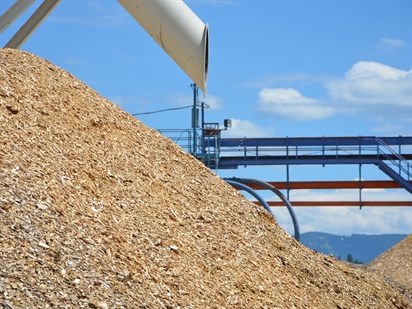
(JULIE WHITTET / iNFOnews.ca)
July 09, 2013 - 2:13 PM
KELOWNA - While Premier Christy Clark was busy with a byelection forum in West Kelowna last Thursday, over in Victoria her minister of forests Steve Thomson was in hot water.
Thomson, also the MLA for Kelowna-Mission, was attacked for signing a deal the NDP opposition says violates the Forest Act.
On January 30th Thomson granted a 10-year permit allowing North Vancouver's Fibreco to export 300,000 tonnes of B.C. wood chips. But NDP forests critic Norm MacDonald says the deal went down in secret without any press announcement nor the support of the minister's own advisory committee.
"It's a sweetheart pre-election deal done in secrecy," MacDonald says. Thomson was re-elected last May to serve another four years as MLA.
Thomson's Chip Export Advisory sub-committee which represents the pulp industry didn't find out until three months after the deal was signed.
The Forest Act states any wood chips exported must qualify as surplus to domestic needs. MacDonald says it's impossible to gauge the supply over a ten year period, especially when pulp mills - and their workers - depend on domestic wood chip production.
On top of that, MacDonald says a shortage of wood chips is expected from forests stricken with pine beetle in Quesnel up to Prince George and Kamloops.
"We know the area involved is going to have a shortage of chips,” he says and estimates logging will be reduced by 50 per cent over the next ten years.
Steve Thomson says he's aware the supply of wood product fluctuates over time.
"That's why we have the provision," he says. "Each permit contains a clause that export may not be allowed if a shortage arises."
Thomson says the deal with Fiberco is business as usual.
"They've had the permit since 1978," he says, and revenues from their export are re-invested in B.C. pellet production and support green forestry jobs throughout the province.
As for discussions with the sub-committee, Thomson says they participated in reviewing Fiberco's application and "their concerns were considered." Thomson says the logging shortage is just speculation on their behalf and should it arise the permit can be revised after a three year period.
But Prince George pulpworkers union president Chuck LeBlanc says you have to look at the bigger picture of B.C.'s forestry industry to determine the wood chip supply.
"Is it a surplus because all these mills have closed?" he asks.
Over the past 20 years the province has lost some of its saw mills, particularly after the pine beetle devastation. It might seem like wood chips have no where to go, but that's not the same as surplus in the production of wood chips.
Pulp and Paper Workers of Canada president Arnold Bercov says, if anything, chips are becoming more expensive and harder to procure, especially for mills that bid against each other for trees.
"Most mills are struggling to get a supply and paying a fair amount of money for the woodchips that are out there," he says.
In Prince George LeBlanc says it's a different situation, Canfor produces the chips to supply its own mill. But for non-integrated forestry companies, they really on the domestic production of wood chips.
On the coast, Bercov says the amount of logs shipped by boat to asia mean the residual chips "don't come back to the fiber basket of B.C. - they're gone."
Any approval to export B.C.'s forest products is poor judgment on behalf of the government, he says.
“To me it's pretty fundamental and simple. We shouldn't be allowing the export of wood chips," he says.
Instead, Bercov says he would like to see the pulp industry receive provincial support to keep the prices reasonable.
LeBlanc agrees.
"If you mill those trees in B.C. you'll be putting more people to work, as a union we've been very against... log exports," he says.
LeBlanc is also cautious of the argument overseas markets deliver profits that boost the domestic industry.
"If we mill this stuff in B.C. a lot of our job problems and economic problems go away," he says. Today wood chip production employs many workers, particularly in Nainamo, Crofton and Prince George.
"There's a lot of jobs tied to chips that come out of our sawmills," LeBlanc says, with Canfor employing roughly 4,500 workers and the saw and pulp mills in Prince George alone employing 1,000 workers.
NDP's MacDonald believes the future of these jobs is precarious under the Liberal government.
"What we've seen increasingly from the B.C. Liberals is their willingness...to send raw logs and chips offshore," MacDonald says, and exporting B.C.'s pulp and wood fibre overseas for processing in Korea and Japan would also mean giving away future job opportunities in B.C.
To contact the reporter for this story, email Julie Whittet at jwhittet@infotelnews.ca or call (250)718-0428.
News from © iNFOnews, 2013